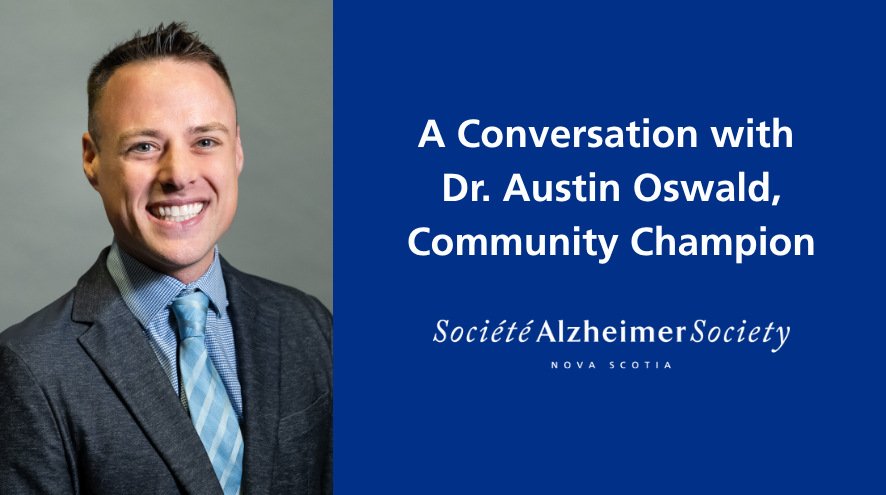A Conversation with Dr. Austin Oswald
We recently sat down with one of our Community Champions, Dr. Austin Oswald and had an opportunity to learn more about his important work with the 2SLGBTQIA+ community.

Earlier this spring, the Alzheimer Society of Nova Scotia launched a new community development initiative to help engage with and reach more Nova Scotians affected by dementia in the communities where they live or identify with. We are very grateful for the support of our Community Champions who have been long-standing partners and collaborators of ASNS. Working together we aim to make an even greater difference, especially for individuals in rural and equity deserving communities.
We recently sat down with one of our Community Champions, Dr. Austin Oswald and had an opportunity to learn more about his important work with the 2SLGBTQIA+ community.
As a Community Champion with the Alzheimer Society, why do you think collaboration with others working in community is important?
I was thrilled to join the Community Champion initiative of the ASNS and believe in its potential to make a significant and positive impact in the lives of individuals living with dementia in our province. Those with 'boots on the ground'—community members who are directly engaged with and know the local contexts—hold invaluable knowledge and lived expertise. They understand the complex and multifaceted challenges of dementia not as abstract problems, but as everyday realities. These individuals are uniquely positioned to identify what matters, what works, and how best to meet their specific community needs. We cannot do this work in isolation from those most affected. They already know what works—we just need to listen!
You have deep experience fostering age-friendly communities. What are a few lessons that you would like to share that could help our communities also become more dementia friendly?
While the concept of age-friendly communities is well-intentioned, I find it limited in its capacity to address the realities of structural oppression. To truly support diverse aging experiences, we must move beyond this framework and work toward building age-equitable and socially just communities. Chronic stress and discrimination associated with being part of a marginalized group are well-documented contributors to adverse health outcomes, including cognitive impairment. These factors help explain persistent disparities in dementia prevalence and care that disproportionately affect racialized and 2SLGBTQIA+ communities. We must also address the stigma surrounding dementia, which can delay diagnosis and prevent individuals from accessing necessary care and supports. My hope is that by fostering communities where all people feel safe, valued, and respected, we can not only reduce dementia risk but also ensure access to affirming and inclusive services for everyone at all ages.
June is Pride Month! How can we help our 2SLGBTQIA+ older adults age in place in community? Is there a best practice or small action that each individual can take?
Happy Pride Month! This is a time to honour the efforts of those who came before us—individuals who fought courageously for 2SLGBTQIA+ rights, recognition, and freedoms. As we celebrate the strength and resilience of these communities, we must also acknowledge that many of the elders who led these movements are now living with dementia.
Egale offers valuable resources on dementia and caregiving for 2SLGBTQIA+ people. Yet many 2SLGBTQIA+ older adults living with dementia lack a care partner or adequate support. You can take meaningful action by supporting 2SLGBTQIA+ organizations—whether by attending educational events, donating to grassroots initiatives, amplifying voices on social media, volunteering, or engaging in advocacy. Building inclusive and affirming communities requires all of us, across generations.
Is there a resource that you would like to share to help our communities become more dementia friendly, inclusive, and supportive of all older adults including those in equity deserving communities?
The Alzheimer Society is a leader in this area, so I suggest looking to your provincial and national Alzheimer’s Society for resources. In addition to accessing support services, consider engaging with your elected officials. They represent you and can advocate for policies and funding that meet the needs of people living with dementia and their care partners. Advocacy can take many forms: writing a letter, making a phone call, speaking up at a town hall, or signing a petition. While change may not happen overnight, ongoing advocacy efforts are essential to driving meaningful, long-term improvements. As Maggie Kuhn, founder of the Grey Panthers, wisely said: “Speak your mind, even if your voice shakes.”
As a researcher and professor, what is a key message for young adults to understand on how to engage with older adults living with dementia in our communities?
I would emphasize the importance of patience, empathy, and meeting people living with dementia where they are. Recreation and leisure activities—such as music, movement, and games—can offer powerful opportunities for connection and engagement. It's important to look beyond the diagnosis and take the time to learn about a person’s life history, identities, and interests. These personal insights can help foster more authentic, respectful, and affirming relationships—especially when you engage in meaningful activities that reflect who they are.
Thank you, Dr. Oswald, for taking the time to share your expertise and valuable insights with us!
